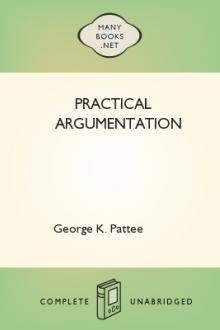The author's aim has been to produce a book that is practical,-- practical from the student's standpoint, and practical from the teacher's standpoint. The study of Argumentation has often been criticized for being purely academic, or for being a mere stepping-stone to the study of law. It has even been said that courses in Argumentation and Debate have been introduced into American colleges and universities for no other purpose than to give the intellectual student the opportunity, so long monopolized by his athletic classmate, to take part in intercollegiate contests. The purpose of this book is to teach Argumentation, which is not a science by itself but one of the four branches of Rhetoric, in such a way as to remove these criticisms.CHAPTER II THE SUBJECT The subject of an argument must always be a complete statement. The reason for this requirement lies in the fact that an argument can occur only when men have conflicting opinions about a certain thought, and try to prove the truth or falsity of this definite idea. Since a term--a word, phrase, or other combination of words not a complete sentence--suggests many ideas, but never stands for one particular idea, it is absurd as a subject to be argued. A debatable subject is always a proposition, a statement in which something is affirmed or denied. It would be impossible to uphold or attack the mere term, "government railroad supervision," for this expression carries with it no specific thought. It may suggest that government railroad supervision has been inadequate in the past; or that government supervision is at present unnecessary; or that the government is about to assume stricter supervision. The term affords no common ground on

Write Your Reviews